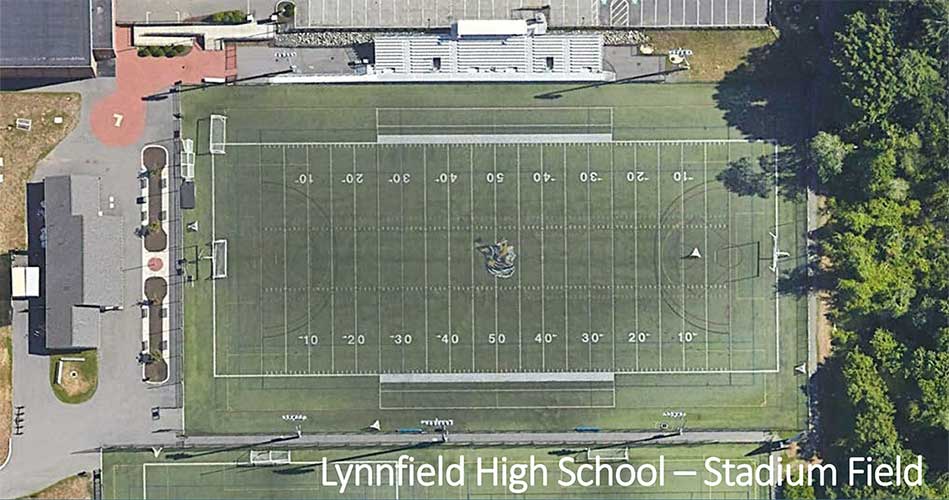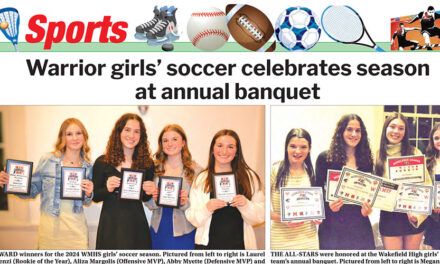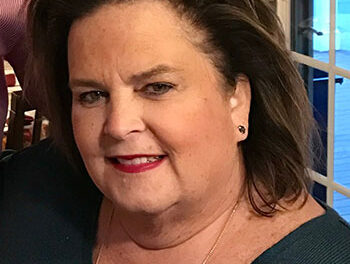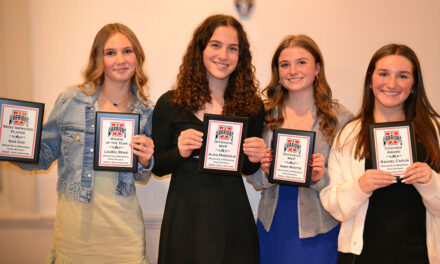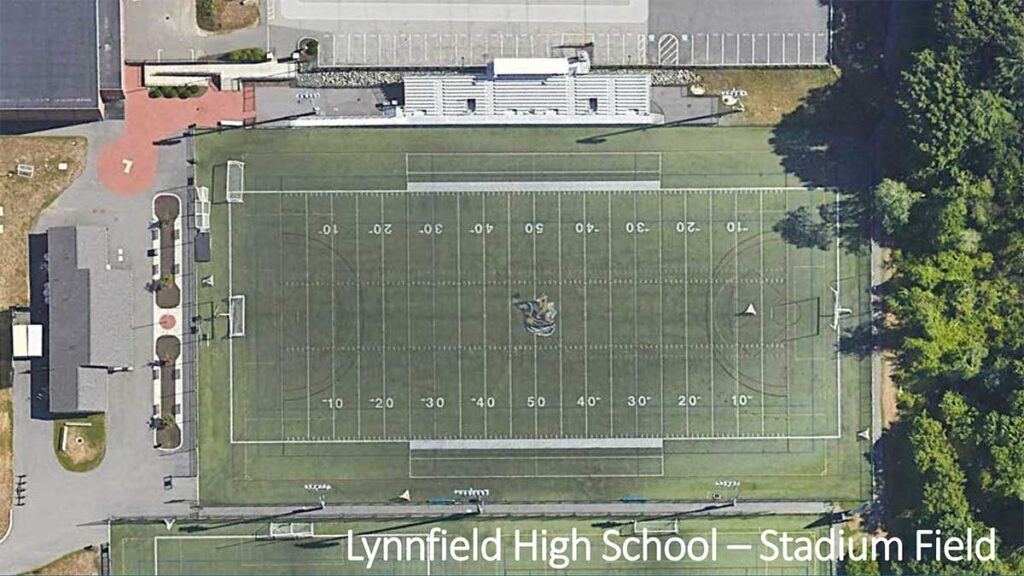
FALL TOWN MEETING on Wednesday, Nov. 13 will be asked to approve transferring funds from the Recreational Capital Trust in order to replace the turf field at Lynnfield High School’s Pioneer Stadium.
By DAN TOMASELLO
LYNNFIELD — Voters at Fall Town Meeting will be asked to approve transferring funds from a revolving account in order to replace the turf field at Pioneer Stadium.
Department of Public Works (DPW) Director John Scenna said during a joint Select Board, Finance Committee and School Committee meeting on Oct. 28 that Article 3 will request Fall Town Meeting to approve transferring $905,000 from the Recreational Capital Trust in order to replace Pioneer Stadium’s field. Fall Town Meeting will take place on Wednesday, Nov. 13, beginning at 7 p.m. in the Lynnfield Middle School auditorium.
The project does not require a debt exclusion vote.
“I feel that the timing is right and our working committee does as well in regards to the replacement of the turf at Field 1 at Lynnfield High School,” said Scenna. “Field 1 is our stadium field at Pioneer Stadium. It is our home field for varsity football, varsity boys’ and girls’ soccer, and varsity boys’ and girls’ lacrosse. It hosts field hockey games as well. There is a really unique opportunity in this town that even young children can play on a varsity field because that is what this complex allows children to do. I am most familiar with youth soccer, and we put our first and second-graders out there once a season just to get them excited about what their future holds. It also introduces families of those young children to what is to come in the future.”
Scenna said Pioneer Stadium is “more than just a field.”
“It is a center of community,” said Scenna. “One of the most exciting times of the year is when the high school teams roll into the playoffs, which they are about to do for football, field hockey and girls’ and boys’ soccer. Everybody comes down to support these athletes. We want to make sure this field is in the most pleasing form not only in terms of aesthetics, but also in terms of player safety. That is very important.”
Scenna recalled that the LHS fields’ complex was constructed 10 years ago.
“Gale Associates was the design engineer at the time, and they worked for the Fields Committee,” said Scenna. “Gale is back and we have reengaged their services to develop plans to go out to bid for this replacement project. What the Fields Committee also did aside from building a beautiful complex was they created a mechanism to fund the future replacement of the turf. This is an artificial field that is similar to a carpet in a home. It has a lifespan. They had the foresight at the time to create a stabilization fund just for the purpose of replacing turf in the future.”
Scenna said there is currently $905,000 in the Recreational Capital Trust.
“That is, in our opinion, enough to move forward with the replacement of this field,” said Scenna. “That replacement fund gets money put into it from user fees. Seventy-five percent of every $1 raised goes to these fields.”
Scenna said Pioneer Stadium and all of the turf fields are built on a stone base. He said the new field will include a safety pad below it.
“The pad helps prevent concussions by softening the field,” said Scenna. “It also helps performance to some extent. A lot of these pads began being installed at fields three or four years after we built ours, and it is now common technology and a common practice to install that. Our proposal is that the new Field 1 would have that pad in it.”
Scenna said the new field will have a “thicker” fiber.
“That is the turf grass,” said Scenna. “A thicker fiber slightly gets more years out of the product. It is a much better product to play on.”
Scenna said the LHS fields’ complex currently includes rubber infill.
“Today, there are a variety of turf infills to select from,” said Scenna. “We don’t have a decision at this point in time because we are very early in the process. We have discussed the possibility of getting away from rubber and using some other turf infill.”
Scenna said Gale Associates has informed local officials that BrockFill, a 100 percent organic infill, has replaced rubber that was previously included in turf fields in other communities.
“That is a manufactured wood fiber material we could use moving forward,” said Scenna.
Scenna said the field replacement project will go out to bid. He said it will not take long to replace the field.
“If the weather cooperates, this should be a two-week turnaround,” said Scenna. “We have seen some local communities not too far from here do it in less than that.”
Scenna encouraged all three boards to support the Pioneer Stadium turf field replacement project.
“I think it is really important to stay ahead of the curve and get one field replaced,” said Scenna. “The entire complex was built at the same time. What we want to do is prevent a situation where multiple fields are failing at the same time. One of the first communities to build a complex with all turf was in Lancaster, Massachusetts. There were kids tripping on the fields because the seams that connect were failing. They were forced to pay for a really big project because they waited too long.”
Scenna said Pioneer Stadium is well-maintained.
“It is used a lot, which put us in a position to replace it,” said Scenna. “It is respected by varsity players, their coaches and there is very little abuse on that field. It is great to open it up to the youth organizations because they respect it.”
School Committee Chair Kristen Grieco Elworthy noted that replacing Pioneer Stadium’s field will “deplete” the Recreational Capital Trust. She asked what is the plan to replace the other fields at LHS.
Recreation Commission Chair Mike Cuddy said the panel raised field user fees this year.
“We have raised around $90,000 a year on average over the last 10 years,” said Cuddy. “If we use it all and don’t have to replace the other fields for another three years, you are right that we still won’t cover the cost of the other fields. But we raised our rates and have put it on a graduated scale moving it forward. We haven’t raised the rates in 10 years, and this year was our first jump from $30 per user to $40 per user. Our rental fees also went up.”
Scenna also noted that the baseball and softball fields are “not wearing as aggressively as the multiuse fields.” He said Fields 2 and 3, which are located behind Pioneer Stadium, are in better shape than Field 1.
“Fields 2 and 3’s wear and tear is not as aggressive as Field 1,” said Scenna. “Everybody wants to use Field 1. Fields 2 and 3 are not wearing as aggressively, but there is going to be a need to replace them. Public Works is proposing to replace Field 1 as part of its capital program to try and keep things in balance.”
In response to a question from Elworthy, Scenna said Pioneer Stadium’s field passed a GMAX safety test before the start of last year’s spring sports season and this year’s fall sports season. All of the fields passed the test.
“It’s a fall test and the field has to cushion enough in order for sports to take place,” said Scenna. “From a player safety perspective, there is no issue.”
Scenna said other communities have replaced rubber with other materials in turf fields due to concerns about cancer and exposure to PFAS.
“There have been several studies,” said Scenna. “We had a long discussion at our working session about that. Right now, there doesn’t seem to be proof to that affect, but people are getting away from it and going to other material. You have to be careful because some towns not too far from us tried to go really environmental, and ended up with really slippery fields that are hard to play on. It is a balance, and you have to rely on facts and data.”
Select Board member Alexis Leahy asked what is the cost estimate for the turf replacement project.
While Scenna said Gale Associates’ conceptual cost estimate is $1.15 million, he “feels confident we can bring that number down as we narrow the scope and define the work a little more.”
Finance Committee member Kristen Dorsky inquired how long will the new Field 1 last.
Scenna anticipates the new Pioneer Stadium field will last between 12 to 15 years.

